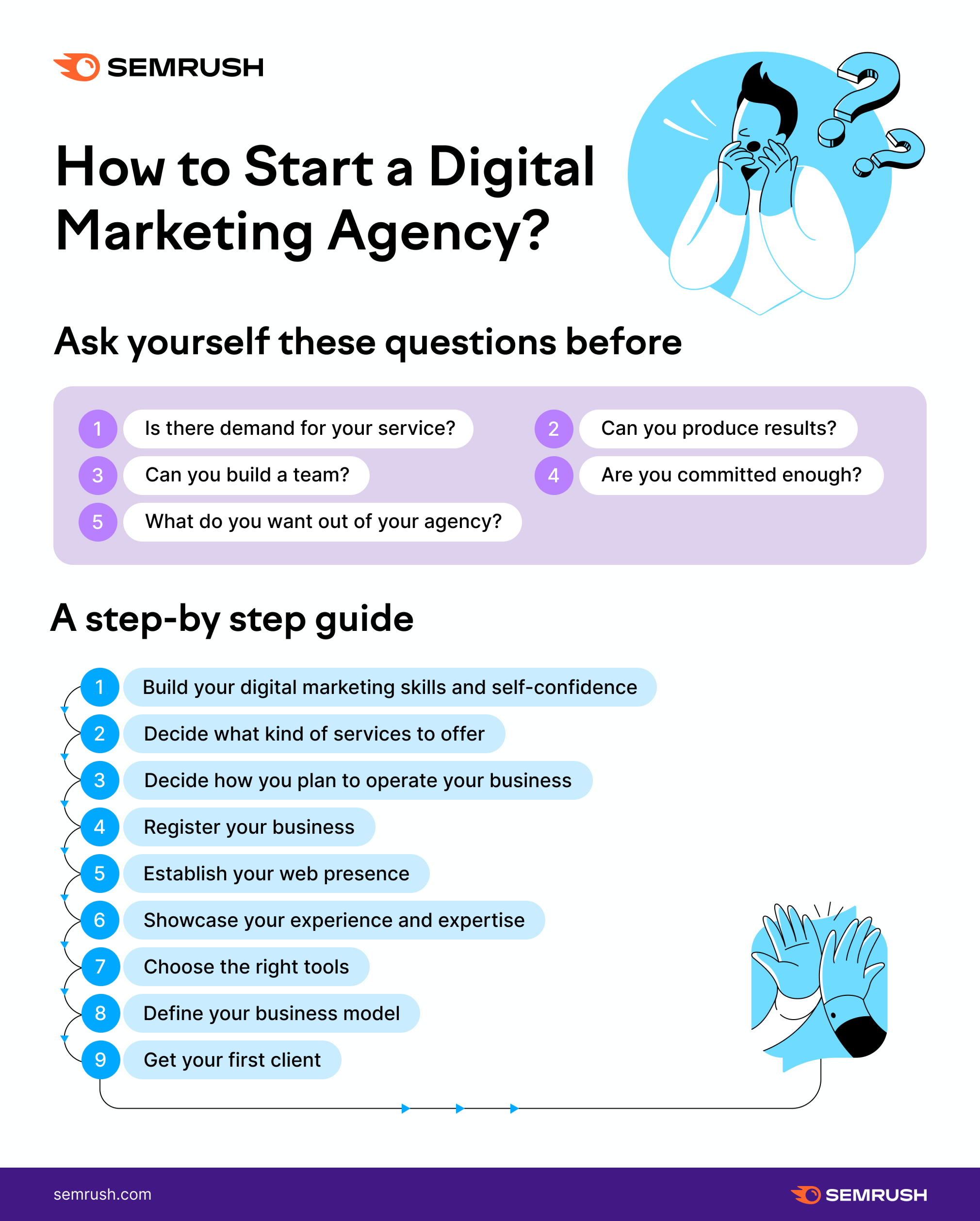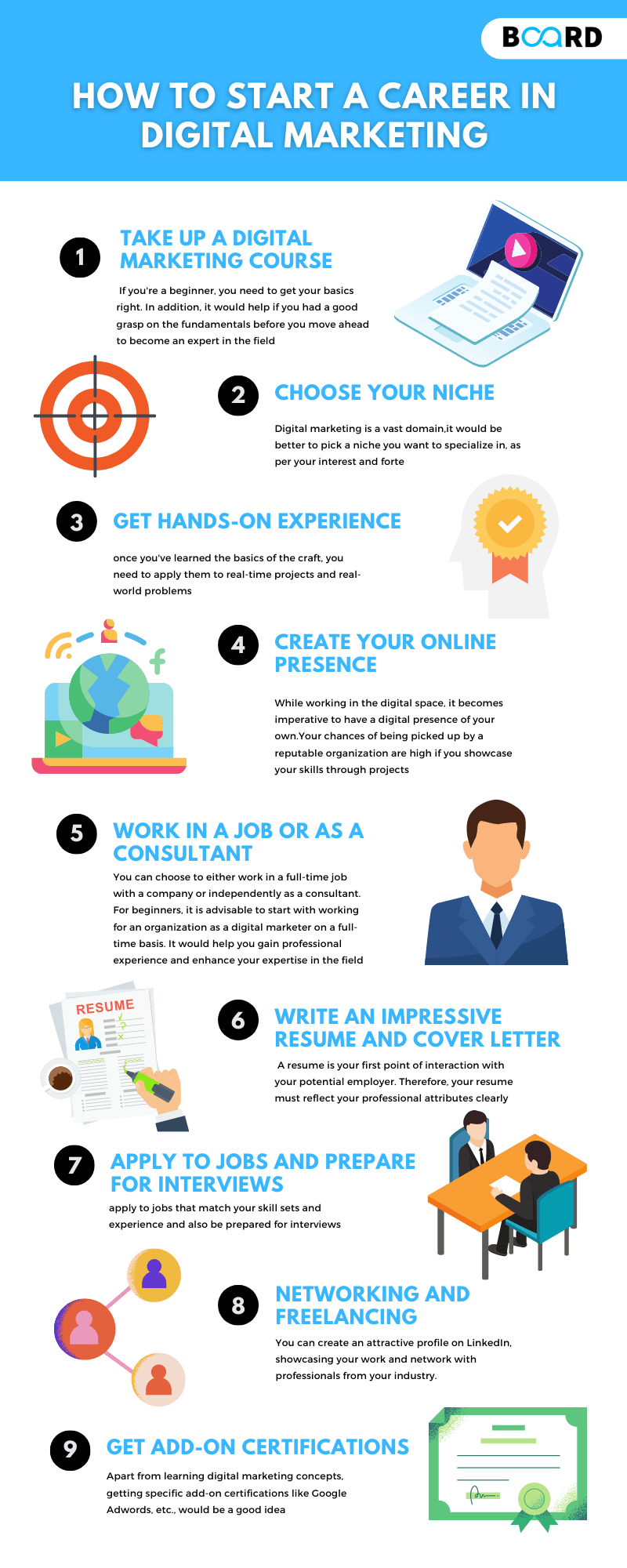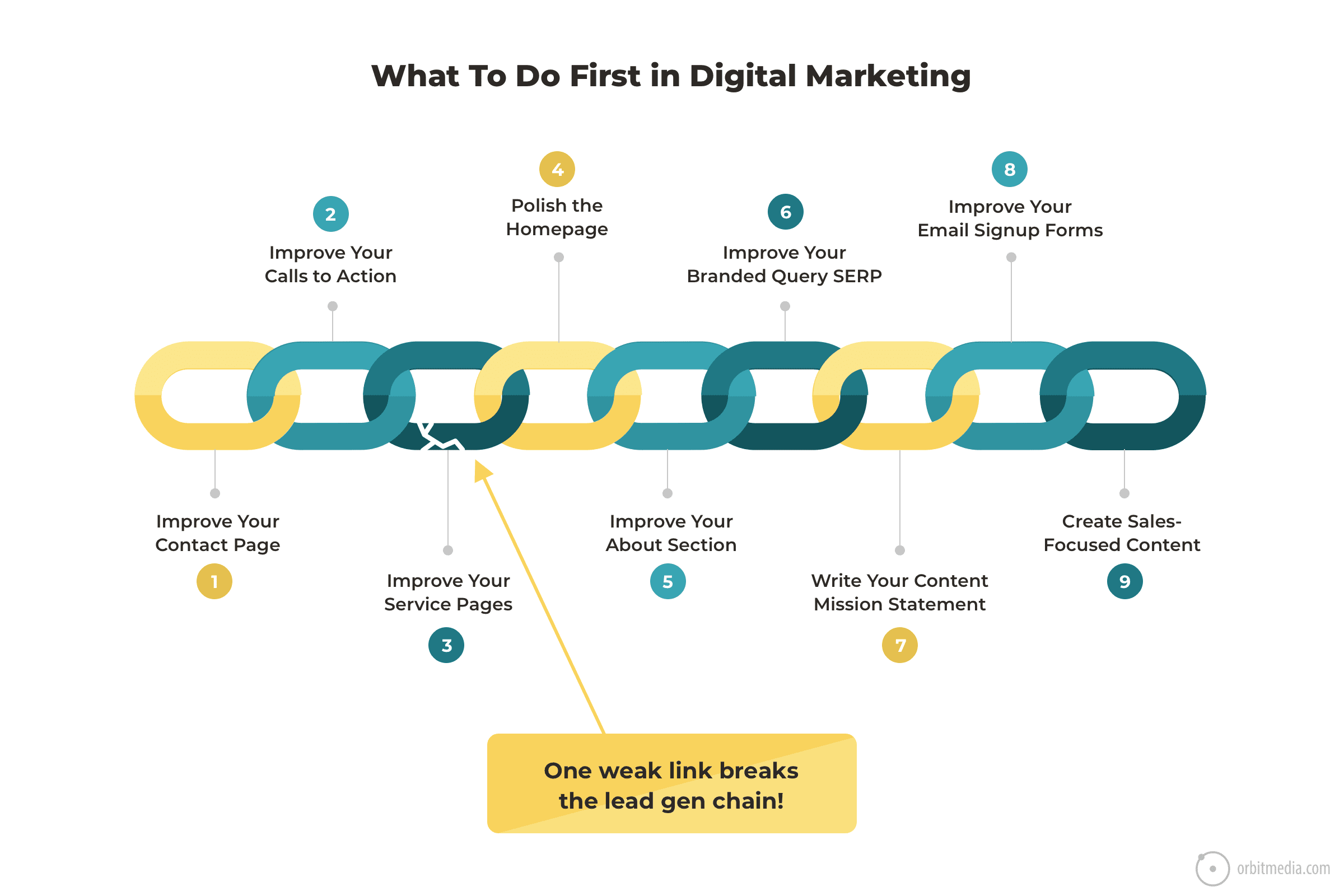How Do I Start Digital Marketing?
To start digital marketing, create a strategy and build your online presence. Educate yourself on current trends and tools in the digital space.
Engaging in digital marketing requires a strategic approach, beginning with an understanding of your target audience and objectives. Building a strong foundation involves setting up a professional website, optimized for search engines, and establishing profiles on relevant social media platforms.
Content creation is next, focusing on value and relevance to your audience, ensuring engagement and sharing. Utilizing tools like Google Analytics helps in tracking progress and making informed decisions. Networking with other digital marketers and attending webinars or workshops can further enhance your skills and keep you updated on industry changes. Digital marketing's dynamic nature demands continuous learning and flexibility to adapt to the evolving digital landscape.
Embarking On Your Digital Marketing Journey
Starting in digital marketing seems overwhelming, right? Not anymore! Begin with clarity and direction to make your online presence felt. Let's dive into the critical first steps to set the stage for success in the digital world.
Identify Your GoalsIdentify Your Goals
Knowing what you want is key. Your digital marketing adventure starts with clear goals. Want more website visits? Higher sales? Set specific, measurable aims. Goals guide your strategy and help measure success. Below are steps to define your goals:
- Be specific with what you want to accomplish.
- Make sure your goals are measurable.
- Ensure they are achievable and realistic.
- Check if they are relevant to your business.
- Set a timeframe for your goals.
Research Your Target Audience
Know your audience inside and out. Who are you talking to? Understanding your audience shapes your message. Research their preferences, habits, and needs. This knowledge makes your marketing efforts hit the mark. Check out these tips:
| Audience Aspect | Research Points |
|---|---|
| Demographics | Age, gender, location, income |
| Interests | Hobbies, brands, products |
| Behaviors | Buy, browse, review online |
| Challenges | Common pain points and problems |
Crafting A Digital Marketing Strategy
Crafting a digital marketing strategy is much like navigating a ship through unfamiliar waters. To reach your destination, you must chart a course that leads to success. In the ocean of online marketing, your strategy is your map. It guides you in making impactful decisions that drive growth. A strong plan includes selecting the right marketing channels and allocating your budget efficiently.
Selecting The Right Channels
Not all channels are suitable for every business. Choose channels that best fit your target audience and goals. Consider these factors:
- Target Audience: Know where they spend time online.
- Content Format: Match content with channel strengths.
- Resources: Assess manpower and skill sets.
Consider trying a mix of channels initially. This ensures broad reach. Later, focus your efforts on what works best.
Allocating Your Budget
An effective budget is critical for your strategy's success. It should reflect your business goals. Allocate with these tips:
| Goal | Budget Allocation |
|---|---|
| Brand Awareness | High on social media and content |
| Lead Generation | Invest in PPC and email campaigns |
| Customer Retention | Spend on engagement and personalized marketing |
Remember to keep track of spending. Adjust based on performance and insights from analytics. This ensures your investment yields maximum returns.
Building Your Online Presence
Building your online presence serves as the digital foundation of your brand. Connect with your audience where they spend most of their time: online. Begin with these crucial steps to dominate the digital marketing world.
Creating A User-friendly Website
First, establish a home base for your brand with a website. Keep it simple, clean, and quick to load. Your website must guide visitors effortlessly, offering value with each click. Focus on user experience by providing:
- Clear navigation
- Mobile responsiveness
- Fast page-loading times
- Accessible contact information
Implement SEO best practices to ensure your site ranks well on search engines. Utilize keywords relevant to your business, optimize your images, and regularly update your content.
Engaging Through Social Media
Social media is not just for sharing memes; it's a powerful tool to grow your circle. Select platforms that align with your brand and audience. Optimize your profiles with engaging imagery and compelling bios.
| Platform | Audience | Content Type |
|---|---|---|
| General | Videos, News, Blog Posts | |
| Young Adults | Images, Stories, Reels | |
| Professionals | Company News, Professional Articles |
Engage regularly with your audience through posts, comments, and messages. Share valuable content consistently to keep them connected and interested.
Content Is King
Embarking on the digital marketing journey unlocks a world where content reigns supreme. Effective content captures attention, engages audiences, and drives traffic. It is a crucial ingredient for digital success.
Quality content helps build trust and authority in your industry. It turns visitors into loyal customers. Ready to make your mark? Discover how to create a stellar content marketing plan and grasp basic SEO practices.
Developing A Content Marketing Plan
Start with clear goals and know your audience. What do they need? How can your content help?
- Set measurable objectives
- Analyze your target market
- Choose the right content types
- Plan a content calendar
Create a mix of blogs, videos, infographics, and podcasts. Align them with key dates and events. Use tools like Google Analytics to track success. Adjust your strategy as needed.
| Content Type | Examples | Purpose |
|---|---|---|
| Blogs | How-tos, Listicles | Educate and Engage |
| Videos | Explainers, Testimonials | Demonstrate and Showcase |
| Infographics | Statistics, Processes | Simplify and Inform |
Understanding Seo Basics
SEO makes content discoverable. It's vital for visibility. Learn it to lead the digital marketing game.
- Research keywords your audience uses
- Incorporate these keywords naturally
- Optimize titles, headers, and meta descriptions
- Ensure your website is mobile-friendly
Engaging, SEO-rich content climbs search rankings. Use tools like SEMrush or Moz for keyword insights. Update old content to stay relevant.
Leveraging Email Marketing
Email marketing stands as a cornerstone in the digital marketing realm. It's personal, direct, and customizable. It allows brands to reach audiences with tailored content, encouraging engagement and conversions. Mastering this art is crucial for any digital marketer starting out.
Setting Up Email Campaigns
Initiating a successful email campaign involves several steps:
- Choose a Reputable Email Service Provider (ESP): Select an ESP that suits your business needs.
- Build Your Email List: Gather subscribers through sign-up forms on your website or social media pages.
- Segment Your Audience: Group subscribers based on behavior, interests, or demographics.
- Create Compelling Content: Write subject lines and messages that engage your audience and prompt action.
- Design Your Emails: Use responsive templates that look good on any device.
- Test and Send: Perform A/B testing to determine what resonates best with your audience, then send your email.
Measuring Email Marketing Success
Tracking the right metrics is vital for refining your email marketing strategy:
| Metric | Importance |
|---|---|
| Open Rate | Shows the percentage of recipients who opened your email. |
| Click-Through Rate (CTR) | Indicates the number of clicks on links within the email. |
| Conversion Rate | Measures how many subscribers completed the desired action. |
| Bounce Rate | Tracks emails that weren't successfully delivered. |
| Unsubscribe Rate | Gauges how many people opted out of your email list. |
Use analytics to tweak and improve future campaigns. Regularly review these key performance indicators for insights into your audience's preferences and behaviors.

Credit: www.semrush.com
Mastering Online Advertising
Digital marketing doesn’t stop at content creation and search engine optimization. To truly thrive online, mastering the art of online advertising is essential. It's a powerful way to reach a targeted audience, drive traffic, and boost sales. Let’s dive into the world of online ads where clicks can convert into customers.
Exploring Pay-per-click Advertising
Pay-per-click (PPC) is a must-try for beginners. You pay only when someone clicks on your ad. It's like a faucet; turn on the budget, and watch the traffic flow. Below are key points to start:
- Set clear goals: Know what you want, leads or sales?
- Choose a platform: Google Ads or Bing Ads are good starts.
- Research keywords: Use tools like Google Keyword Planner.
- Create compelling ads: Make every word count.
- Track performance: Analyze data to improve campaigns.
Using Social Media Ads Effectively
Social media ads can skyrocket your brand's presence. Each platform offers unique ad types designed to meet various goals. Here’s a simple guide to get you started:
| Platform | Audience | Ad Types |
|---|---|---|
| Wide demographic | Image, video, carousel | |
| Young adults | Stories, in-feed, IGTV | |
| Professionals | Sponsored content, InMail |
Remember to:
- Define your target: Age, interests, and behaviors matter.
- Set a budget: Start small and scale with success.
- Create engaging visuals: Eye-catching images win clicks.
- Test and learn: Try different ad formats and messages.
Analyzing And Refining Your Strategies
Analyzing and refining your digital marketing strategies is crucial. It helps to sharpen your tactics. You understand what works, what doesn't, and why. With continuous analysis, you make informed decisions. Such smart moves can lead to better results and a stronger online presence.
Using Web Analytics Tools
To get started, use web analytics tools. These tools give insights. They track website traffic. They monitor user behavior. Learn what draws visitors to your site. Know where they spend most of their time.
You check performance metrics too. Look at:
- Page views: Total views a page gets.
- Bounce rate: Visitors leave without action.
- Conversion rate: Visitors complete a goal.
Google Analytics is a go-to tool. It's free and broad. You track ad campaigns. You also see referral sources. This helps tailor your strategies.
Adapting To Market Trends And Insights
Digital marketing is fast-paced. Trends change quickly. You need to keep up. Adapting to market trends is essential.
Stay informed. Read industry reports and news. Use social media listening. This shows what your audience wants.
Customer feedback is precious. It gives you direct insights. Use this feedback to adjust your tactics. Make changes that reflect customer needs.
Keep looking at competitors too. See what they do well. Learn from their successes and mistakes. A competitive analysis helps you stay ahead.
| Strategy | Tools | Action |
|---|---|---|
| Understand Market | Surveys, Reports | Analyze trends |
| Customer Feedback | Reviews, Chats | Refine products |
| Competitor Analysis | SEO Tools | Adapt strategies |
Refining strategies is ongoing. Adapt when needed. This ensures your digital marketing journey is successful. Use the data. Be flexible. And always aim for better engagement and conversion rates.

Credit: www.boardinfinity.com

Credit: www.orbitmedia.com
Frequently Asked Questions Of How Do I Start Digital Marketing?
What Are Digital Marketing Basics?
Digital marketing encompasses various strategies such as SEO, content marketing, email campaigns, social media promotion, and PPC advertising, all aimed at reaching online audiences effectively.
How To Set Digital Marketing Goals?
Identify your target audience, analyze competitors, establish measurable objectives, and decide on key performance indicators (KPIs) to track your progress and success in digital marketing.
What Skills Are Needed For Digital Marketing?
Digital marketing requires proficiency in SEO, content creation, data analysis, strategic planning, and familiarity with digital advertising platforms and social media.
Which Platforms Are Best For Digital Marketing?
Select platforms where your target audience is most active — often, this includes Google for search advertising and SEO, Facebook and Instagram for social media campaigns, and LinkedIn for B2B marketing.
Conclusion
Embarking on a digital marketing journey may seem daunting, but it's a pivotal step in today’s online-driven marketplace. Remember, successful strategies start with clear goals and a willingness to adapt. Your path will blend creativity with analytics, and dedication with innovation.
So, take that first step, stay informed, and watch your business thrive in the digital realm.



0 Comments